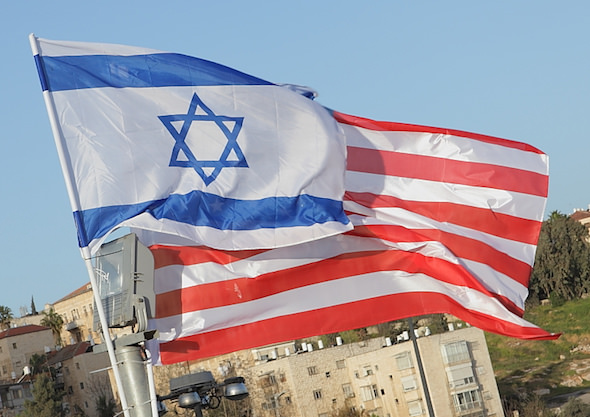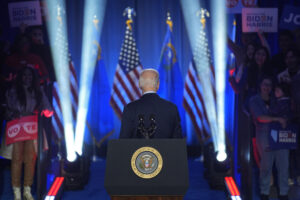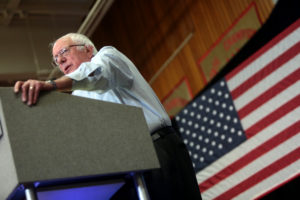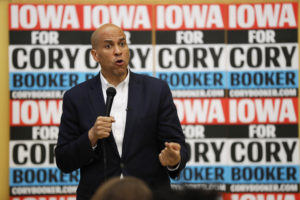AUDIO: Robert Scheer Interviews Tom Dine, a Longtime Advocate for Israel and Mideast Peace
In Friday's episode of "Scheer Intelligence," Truthdig's editor-in-chief speaks with Tom Dine, senior policy adviser at the Israel Policy Forum and former head of the American Israel Public Affairs Committee, about Dine’s career in public service, the thwarting of the Israeli-Palestinian peace process and Dine's role in negotiations between Syria and Israel in recent years. Ze'ev Barkan / CC BY 2.0
Ze'ev Barkan / CC BY 2.0
Read the transcript below.
Hear other episodes of “Scheer Intelligence” here.
Robert Scheer: Hello, I’m Robert Scheer, and welcome to Scheer Intelligence, my new podcast in collaboration with KCRW. My guest today is Tom Dine, the senior policy adviser at the Israel Policy Forum. He has had a 53-year career in American foreign policy. Highlights of his public service were 10 years in the U.S. Senate, where he worked with the legendary Frank Church from Idaho; he worked with Ed Muskie; and he worked with Ted Kennedy, when Ted Kennedy ran for president in 1980. He also at one point was president of Radio Free Europe, based in Prague, during the height of the Cold War. But he’s probably most well known—I shouldn’t say probably; he’s unquestionably most well known—as having run AIPAC, the American Israel Public Affairs Committee. And AIPAC is well known as probably the most powerful lobby in Washington; it’s a lobby, basically, for Israel. It is a lobby that’s gone through different transformations. It’s been feared as having enormous political power, and maybe that’s been exaggerated, maybe it’s not.
But that’s not the reason for talking to Tom Dine. I’m talking to him as yet another person in these podcasts who I consider an American original. And the crazy quilt of American culture, with our immigrants and slave, ex-slaves and people of different religions and backgrounds, throws up very interesting personalities. And Tom Dine is one such personality. He started out as an idealistic volunteer for the Peace Corps in the Philippines; he was definitely on the liberal side of things during those years in the Senate. I first met him when he was working for Ted Kennedy, who I did admire very much. And you know, then he went to work for AIPAC, and he took a rather strident position; he was hanging around with people like Jeane Kirkpatrick and Richard Perle; he certainly enthusiastically supported the first Gulf invasion; he wasn’t at AIPAC for the second one, but he did support it. And then most recently, he’s had some reservations about the more hawkish side of things. He was one of a hundred prominent supporters of Israel who asked Bibi Netanyahu to be more responsive to what Barack Obama was trying to do in the negotiations with Iran, and to revive a two-state solution for Israel and the Palestinians as a way towards peace. And now he’s emerged as a more dovish presence, as have many people before.
I want to begin with my own personal reflection on this. I happened to go to Israel at the time of the Six-Day War; I was in Egypt at the end of that war, I saw it from the other side, and then went over to Israel. And when I was in Israel, I went over into the West Bank, which was occupied. And one thing that struck me is that the Palestinians had not attacked Israel; the Palestinians were in fact an occupied people. They were occupied in what we now think of as the West Bank by Jordan, in the Golan Heights by Syria, and Egypt had occupied Gaza. And Gaza was a particularly miserable place. So these were not mild occupations. And there was no Palestinian army; the Palestinians were not in a position to threaten Israel. So this was a war with Arab powers—Arab powers that Israel has come to peace with; Syria a little more problematic, certainly with Jordan, certainly with Egypt. And somehow the Palestinians get left out. And at that time I remember interviewing Moshe Dayan, who was the legendary leader of the Israeli victory, [and] others. They were doves in the basic sense; they were supporters of the Labor Party, they believed in peace, they believed you shouldn’t occupy a people. They talked about, you know, “Come back in five, 10 years, you’ll see; this will be wonderful; there will be irrigation, these people will be happy, and of course they’ll move to their own society and not be threatened by us, and we’ll live in peace.” I think they believed that, in some basic way. But now, talking to Tom Dine, somebody who’s lived through this world; you’ve had drinks with [Yitzhak] Rabin, you were in Israel many times; you were actually in Syria as well. And you’ve been up to your eyeballs in this whole thing. Was that a naive reading on my part of those early days, and in fact, what has changed?
Tom Dine: It is not naive, what you just said. But it’s a long history. And frankly, I agree with what you said and still believe it. There’s a, for some of us, there’s a dream about Israel, that we will live up to what Hillel told us to do: Act on your values. The values being a nation state in which Jews are not slaughtered; a nation-state that [is] based on Talmudic ethics, on modern contemporary rule of law in which justice is equal for all. So all those things are still certainly in my head, and in my drive for Israel to come to terms with, as you said, the Palestinians, who have been left out. Left out for a variety of reasons, mainly because Arabs don’t like them. In fact, as we’re seeing now in this blood-soaked region of the world called the Middle East, the Arabs don’t like each other.
RS: Let me stop for a second on that: “The Arabs don’t like them.” Because I think there is a kernel of truth to this. The Palestinians were very much like the Jews; people of the diaspora. And that diaspora included the Arab world. Very often, they were people who took up occupations that required a certain kind of learning or a certain kind of skill that wasn’t being supplied in that society. When I was in Egypt, there were Palestinians who were advisers to the government, or who knew how to make things work, or who had medical education. And the Palestinians spread throughout the world; they are basically a diaspora people.
TD: And a smart people.
RS: Yeah, and—we’ll I’m of sort of the view that most people are smart, or can be smart with the proper education. But leaving that aside, it always struck me as ironic that they’re two people that really had a great deal in common, were the Palestinians and the Jews—including the Jews who went to Israel. But basically, [they] came out of the whole European experience; they were treated with suspicion where they went, they were marginalized at times. And as I said, with the Six-Day War, nobody really on either side wanted to give them a state at that point; they were used as a pawn. Was that not the case?
TD: It was the case, but you’re leaving out part of that history, which is that the Palestinians, Arabs, whatever words you want to use—and in the 1930s, ’40s and ’50s, “Arabs” was the name for Palestinians—and the Arabs rejected the 1936 commission that the British put together to try to make it a two-state solution. Then the U.N. activities in ’47 and ’48, and the Palestinians, or Arabs, rejected having a half a loaf. The Jews took a half a loaf, they were to take a half a loaf—RS: Well.
TD: —and have two states.
RS: Yeah, we can—
TD: I don’t want to debate that, Bob—
RS: —yeah, we can have that discussion, because there’s always the other side, who drove who out, who made it so—
TD: —yes, but all I wanted to say was that in my experience, the Palestinians, the Israeli Jews, have so much in common. And whether you love them or hate them, it doesn’t make any difference; they could get along.
RS: I was going to make a point about that. Because somebody I got to know at the time, right at the end of the Six-Day War, I believe his name was Ibrahim Shabat. And I believe he was the mayor of Nazareth. That’s my memory. And people listening to this can fact-check me, but that’s my memory. He had actually given blood to the Israeli Army. And even though Palestinians living in Israel, what was then Israel, were not in the military, they certainly, many of them, seemed to support the Israeli position. So what I’m trying to get at, without revisiting that whole history, for someone like yourself who came from the more progressive side of Jewish life and believed in the two-state solution, it must be disillusioning to find one going from Rabin to [Benjamin] Netanyahu, just to put it crudely. That there was an idealism to the Labor Party and to Israel, and these people with their memories of the oppression of Jews as an oppressed people, to now a situation where they don’t seem to have as much sympathy for other people who are oppressed.
TD: Well, you know, there aren’t that many people who would describe Yitzhak Rabin as idealistic [Laughs]. I would describe him as pragmatic. And the older he got—and I got to know him pretty well when he was out of power—he wanted, he had a concept of a peace process with the Palestinians. And he knew because of his military background and the role he played in ’67, and then his endless discussions within the body politic of Israel, that he could bring it about. And so his assassination is a defining turning point, whatever term you want to use, because it created a different kind of direction for Israel. You know, the what-ifs of history—I’m trained as a historian, and what-ifs are a no-no. But what if Kennedy had lived? What if Lincoln had lived? What if Rabin had lived? Oh, man! I think it would have been, all those situations would have been a different landscape.
RS: Well, and maybe that’s the reason Rabin was assassinated. Because after all—everyone forgets this—Hillary Clinton wrote a piece for [The Forward], a Jewish paper that I grew up with in New York when I was a kid. And I read this column, and it was, you know, reaching; it was fawning in her reaching out to Netanyahu, it was an embarrassment. But it began, I thought, rather sadly, by invoking Rabin and his death. And she doesn’t mention in that piece that Rabin was killed not by a Muslim fanatic; he was killed by a Jewish fanatic—forgotten, that the most vicious attack on the democratic process in Israel on an elected leader was conducted by a Jewish fanatic.
TD: A religious fanatic.
RS: But also a religious fanatic who was participating in a movement that was condemning Rabin as a traitor, that included Bibi Netanyahu.
TD: The assassin said before his terrible deed that he wanted to stop peace. Which to me is a violation of not only ideals, but also pragmatism. And he did. The guy did it. And it’s just heartbreaking.
RS: Let me defend calling Rabin—I don’t know whether an idealist, because Rabin is also the one who defended breaking the bones—
TD: Correct.
RS: —of protesters and so forth. I’m not going to exonerate him. But what I’m saying is there was an idealism to the original Zionist mission; I just don’t think you can doubt that. And whether rightly or wrongly, these are people who said that unless Jews become normal, in the sense that they’re open to all occupations and can have a place where they’re not a marginalized group, that they will never find security. But the idealism was certainly—and you know, this is why you had the kibbutz movement; that Jews would not be exploiters, they would not be occupiers. You know, the whole idealism of the Zionist enterprise in that phase, certainly the Labor Party and people like [Shimon] Peres and Rabin and others, was one of a normalcy. You were not going to be the top 1 percent or something; that, you know, that was a prescription for disaster. You were not trying to get your own little cut of the thing, but instead you wanted to be farmers; you wanted to have a normal life; you wanted to produce things. Because after all, this had been the basis of anti-Semitism: that Jews were not allowed to live normal lives. So that’s the idealism I’m invoking. And now what you have is a caricature of that. That might be a little far for you, I don’t know—
TD: It is, Bob. Because I was just thinking as you were discussing this idealism, which I share—and you see it when you go into Tel Aviv. Tel Aviv is this glass city now. It exploded as the center of technology, of—I know this is a little bit too much, but—Jewish genius. The technological world of today and tomorrow is all there. And that’s where Israeli energies have been channeled. Those people—and I’ve gone there and begged them to get into politics. Bring a different breed of people, a different perspective, to government, to public service—and they have said, to a person, ‘No. I don’t want to be mixed up with politicians.’ It’s the same kind of spirit, or lack of spirit, in Washington today.
RS: OK. But let me just stop you there for a second. So you have this Tel Aviv, very smart people doing stuff. And I have to admit, at that time after the Six-Day War, when I landed and I was in Tel Aviv, I felt incredibly excited. And I’d come from Egypt, which was obviously an authoritarian dictatorship. And I felt free, and I felt excited, and you know, as a Jewish person I felt in many ways liberated; I thought that was very exciting. But then I saw the other side. And the other side was religious fanaticism; belief in a very primitive Old Testament view of life. That hasn’t died. I thought that would go away. I thought as people get educated, just as with fundamentalism in every other religion, you have the hope that somehow, OK, religion will recede in that sense; it’ll inform a different view of spirituality. That was the hope. In fact we’ve seen—and obviously not just in the Jewish world; we’ve seen it in the Muslim world and we actually see it in part of the Christian world—a desire for what Erich Fromm once called “Escape from Freedom.” A turning to totalitarian, you know, dogmatic, religious-based models. And that has to depress you, I think.TD: Well, I read that book when I was in college many years ago. It depressed me then, and it also motivated me, which was, if you’re going to make a better world, you can’t make it like this. You’ve got to have freedom and democracy, and tolerance of each other. So the word I would have used is “disappointment.” Disappointment, it’s, you know, the key to me is creating a state for the Palestinians. Enhancing the Jewish state. There will be norms by which those two can get along, and they will behave in the Westphalian state model: they will have to respect each other’s borders, they will have functioning governments; how you deal with corruption is everybody’s issue, but they won’t go to war. They won’t go to war. But right now you’ve got undeclared violence within each society toward each other and toward themselves. And remember I said earlier, the Middle East today is blood-soaked. And there’s more blood surrounding Israel than within Israel and occupied territory, but the whole region has become a sin against humanity.
RS: Well, let’s talk about that sin. I’m talking to Tom Dine, who for 13 years was head of AIPAC, the much—what’s the right word?—feared, you don’t want to say feared; the incredibly important pro-Israel lobbying organization that many politicians have said you better not cross or you’ll be finished. In fact, when you were running AIPAC, there were a few members of Congress who said you destroyed their career. I think [Paul] Findley was one of them, in Illinois, was it?
TD: Yes, he wrote a book on it. He called me “King of the Jews.”
RS: Yeah, and there were others. And it was not without some cause; AIPAC has a great deal of power. But let me ask you a question about this. One, there had been the assumption among, I would dare say, most Jews, who basically are secular; I don’t think that can be denied. But I guess most people in America who are basically secular; whatever the polls show, the fact is if you look at the way people conduct their lives, they’re pretty much trying to figure things out by a whole range of moral values. Who knows where they get it—the Golden Rule, their mother, whatever. And there had been a sort of assumption we would all become more the same, and then we would meet on other competing fields for technology, or inventing things, or sports, or what have you. But we see the survival of primitive religion, and as I say, in every society; so in the case of Israel, its history was very much disturbed and continues to be disturbed—and I’m using the word advisedly—by people who harken back to the Old Testament, which is not a great book to harken back to. There’s a lot of meanness and blood and violence and so forth in the Old Testament. But leaving that aside, we look at the Arab world, and there again, you know—and here I ask you to be reflective about it—we had basically secular dictators. I mean, the Egypt that I visited had Gamal Nasser as head of it, and these colonels; they were not particularly religious people. They were not driven by some interpretation from Muhammad, or what have you. And then we had less appealing people than even Nasser, and Saddam Hussein, and [Moammar] Gadhafi in Libya, and now [Bashar ] Assad in Syria. And Israel seems to have been on the side of those or worse than the religious leaders. Israel seems to get along with Saudi Arabia better, and that’s the center of Muslim, Sunni fanaticism. It prefers, with the exception of Egypt where it seems to prefer a military dictatorship to say, [Mohamed] Morsi, who got elected, who seems to be a somewhat more moderate Muslim leader. But you’ve spent a lot of time in the Arab world; you’ve been in Syria. Why don’t you give me your take on what seems to be an extreme disintegration, and whether in fact U.S. policy and going into Iraq and trying to find a different way for Syria, whether that’s been unwise.
TD: Well, first of all, the decision to go to war against Saddam Hussein turned out to be probably the worst decision in American foreign policy, not only in our lifetime but previous to that. But I had a very complicated perspective on that, which was, when I was running Radio Free Europe/Radio Liberty, and living in Prague—by the way, it was post-Cold War; it wasn’t during the Cold War as you said in your introduction—we began broadcasting to Iraq and Iran in 1998. And I was visited by officials of the United States government and told that Saddam Hussein had “told his henchmen to blow up Radio Free Europe and kill you, Dine.” And I took that seriously, but I also was going to live my life as I know it as best I could. But I got, we set up a security system, and they never did that. But—
RS: But it does get your attention.
TD: It certainly [laughs], it still is on my mind. And—
RS: I’ve had a few of those. Not from Saddam Hussein, but.
TD: One of the things that I did, Bob, that my bio really doesn’t reflect, after I came back to Washington, D.C., in 2008, I joined a group of prominent Americans—former ambassadors, former congressmen, journalists—who wanted to deal directly with Syria. The George W. Bush White House was thinking about a third Middle Eastern war at that time: Iraq, Afghanistan and Syria, because they hated the Syrians and the Syrians were encouraging foreign fighters to come through the Damascus airport, cross over into Iraq and challenge American troops, NATO troops. But we wanted to figure out a way to mediate. And we dealt with counterparts, quote unquote prominent Syrians. There were eight of us, eight of them, and we all had access to different, to our governments.
RS: This is ’09?
TD: This is ’08, ’09, ’10; it faded in ’11 for obvious reasons when, as you said earlier, Bashar Assad went to war against his own people and started killing them indiscriminately. So we really tried very, very hard to find common ground. And it was one of the most exciting periods of my life, because here I am, a former head of AIPAC, known to be pro-Israel; I’d never, I’m never going to deny that. But I also believe in finding ways to coexist. And there came a time when the Syrians around Bashar and Israelis around [Ehud] Olmert were beginning to talk to each other. And because I had friends on both sides, I was shuttling. I had no official role; I don’t want to pretend that I was prominent. But I was peripheral. And interestingly, they came this close to finding ways to negotiate an end to the occupation of the Golan Heights, to signing a peace treaty between the two countries, which were always at war. In fact, the raison d’être of the Bashar Assad regime, and his father, had been anti-Zionism. So there was this opportunity, and then Olmert decided to go into Gaza in ’08, and that was the end of it. And the Turks had been playing a role. So I’ve been to Syria nine times, with all my credentials. And I have met some of the finest people I’ve ever met in my life. And to go back to your word, secular, these were not fanatics; these were not against-the-world people. These, you know, a certain degree of chips on the shoulder; certainly the Israelis do, certainly American Jews do, and certainly the Arabs do. So there were times when it was close. Another effort was made during George Mitchell’s time as the negotiator for early-days Obama. And again, there was some documents drawn up, and lo and behold, both sides were responsive but it never got there. So Syria and Israel do live, do coexist next to each other, share a common border, or former border too, and—but they just can’t seem to get there. Now Syria really doesn’t exist; it’s a broken, broken country, the death and crippled families are pervasive, political and social fabrics shattered, and some have become terrorists, to use the common nomenclature now. And certainly the economics are in ruins. RS: Well, let me ask you—I’m talking to Tom Dine, who’s certainly been one of the key Washington insiders following events in the Mideast for 50 years, and unquestionably very pro-Israel. And yet you see the consequence of militarism. I think that’s a fair description. And what happened? Who were these people like [inaudible] and others, who you did give some support? Where did they ever get the idea we could go into Iraq and do regime change and get a good outcome? Did they not know that the Shiites might be responsive to Iran? Did they not know there were historic divisions? And the same thing applies to Syria and actually to Libya; I mean in Syria, whatever you think about Assad, the fact is these are the people trying to protect Christians, trying to protect Alawites, they’re trying to protect other people. They weren’t the Sunni majority in that country. Why did you think that if you opened this door to some notion—again, it was regime change—you’re going to find the good Syrians? This is like Graham Greene’s book “The Quiet American.” You’re going to find that third way in Vietnam—well, maybe you don’t know how to find the third way; maybe it’s an act of arrogance to even think you’re supposed to reorder these countries. And I would argue, just to throw my own view into this, I think you make it more dangerous not just for all—I don’t mean “not just” for the people living there, but for Israel. I think you create—and if we think of terrorism, right now where we’re meeting, at a time when a Russian fighter was shot down over Turkey, where you know, people are now afraid to go travel in the holiday season, and so forth—well, both of us are old enough to know that this terrorism has been ramped up largely in direct proportion—maybe it’s not directly responsible all the time, but certainly in direct proportion to our intervention. There was been blowback. How can we deny that?
TD: Well, I don’t deny it. Because it’s—I have tried to deal with it throughout my career. And I see intervention as into three parts: no intervention, moderate intervention and then full intervention, meaning armies. And why—and there’s no success record of armies. Moderate intervention would be not only diplomacy, economic development, but commercial exchanges and a degree of give and take over political structure. The worst thing the left wing can say about me is that I’ve spent my career trying to export democracy. To me, yes, I have [laughs]. And to me that’s been a part of my public service, if you will. And I think because I grew up with the Wilsonian statement about “make the world safe for democracy,” and I grew up with the four freedoms of FDR, and have fully integrated them into my brain and how I’ve tried to act out my values. What’s happened today is a total breakdown of the Sykes-Picot Agreement of 1916 to 1924: Create nation states where there are no real boundaries. There’s nothing but tribes. And the tribes hate each other, or they’re certainly in competition and rivalry. The sects of religion hate each other and can’t get along. And so authoritarian dictators grow up, and they’re the ones who keep the lid on. Saddam Hussein did that in Iraq; you have to admit that. We wiped him out, and Iraq today is a failed state.
RS: Well, you should mention that we were his ally in going against Iran, and Iran was supposed to be—you know, let me just—a gut question I have. Do we have adults watching the store?
TD: [Laughs]
RS: And the reason I ask that question, because both of us—I’m talking to Tom Dine, and we haven’t always agreed; let’s put it that mildly; and I’ve interviewed you, and I’ve been on different sides. But when I come away from it, I wonder—and I teach at a university, where we have—and you talked about yourself being a historian—we have a lot of bright people. But we went through the whole Cold War where no one seemed to be informed by the fact that there was a Sino-Soviet dispute; that there really were not two Communist countries in the world that liked each other, yet we talked about a monolithic international Communism. So we lose in Vietnam in the most ignominious defeat, and what happens? Communist Vietnam and Communist China go to war. You know, and they’re still fighting over these islands, and neither of them—
TD: Right. These are ancient rivalries.
RS: Right, and neither of them liked the Soviet Union, OK. So now we go shift to the Muslim world. And again, we want some bogeyman out there; we want the Muslim terrorist, blah—we ignore that there are different Muslims. You know? There are the Muslims living in Indonesia, and they’re not the same as Muslims living other places. There are Shiites, Sunni, there are other splinter groups and so forth. And so I keep wondering, where are the adults? Where were the people to tell George W. Bush in Washington, get close to him and say wait a minute, you can’t be both anti-Iran and for getting rid of the Sunnis here and breaking up their party and breaking up their claim to any expertise—you know, de-Baathification and everything else—without opening the door to Iran. Because after all, these Shiites, many of them have been living in Iran and have been protected by the ayatollah. So you know, my goodness, where are the people who would say, wait a minute! Stop, time out, you sure you want to do this? You know, do we know what we’re doing?
TD: Well, when it comes to Iraq—and I was living in Prague, so I was not in Washington picking up conversations morning, noon and night—but I heard enough and knew enough that –
RS: Well, you were broadcasting to Iraq, though.
TD: Yes. So I followed events in Iraq very closely. But what I was getting to, Bob, was that Bush, George W. Bush, I believe, wanted to seek revenge for his father. The Kuwait, the first intervention in the Gulf in 1990, ’91, and then George H. W. Bush goes to Kuwait to receive an award, and the word comes forth they wanted, the Iraqis wanted to assassinate him while he was in Kuwait. Whether it’s true or not, I have no idea. All I know is that what was coming out of the White House and getting as far as Prague was “We’re gonna get ’em. This time we’re gonna get ’em,” and the father didn’t go far enough into Baghdad and regime change. So American intervention in Iraq turned out to be a failure, a big failure; maybe even bigger than Vietnam, as you described Vietnam a little earlier. And there’s this belief in certain circles in the American foreign policy establishment that the American sword will control people, put people in their place, and we will be the most, not just the most powerful country in the world, but act that way. You know, if we didn’t say a word, we would still be the most powerful country in the world. Economy, values, social integration—
RS: Well, that’s George Washington’s model in his farewell address. Use gentle means, engage in commerce, but force nothing.
TD: Good for you. That’s a good recall, that’s really important. But you hear it today in the presidential debates.
RS: Oh, I was going to ask you about that.
TD: Who’s gonna—who can out-hawk whom? And to me, that’s, there’s no exit there. The old [Sartre] play. If we continue to go down those roads—and I give Obama credit. Obama is not my cup of tea, and I can say he’s been disappointing to this person—
RS: Is Kerry your cup of tea? He seems to be a pretty good secretary of state.
TD: Well, he’s certainly active.
RS: No, but he’s also—you know, the opening to Cuba, the negotiation with Iran. I didn’t think he had it in him. I mean—
TD: Oh, I understand. I knew him before he was a senator, and I knew him, I was there in fact the day he threw his medals, his Vietnam medals into the pile in front of the Capitol. So I’ve known him a long time. And, but we all grow on the job. You’re looking for adults; I’m looking for people who are bigger in office than you thought they were. And I don’t think we have those people today. I don’t know why, because we’re such a well-educated country. And it’s not a question of how many degrees you have; it’s your judgment.
RS: Well, your integrity, also. I mean, the fact of the matter is, you have to be willing to go against the grain and speak sense. And let me just—
TD: Well, excuse me—I’ll defend Obama this way. He has gone against the grain. For those of us brought up on the American exceptionalism school of thought, he doesn’t want us in another ground war.RS: Yeah, well, but they have these drone wars, they have this high tech—
TD: And 50 guys here, and 50 guys there, and pretty soon you got combatants.
RS: —but you could also get a lot of people killed. But let me ask you a question, because you’re Tom Dine, and you were the head of AIPAC, which, again, I think, [is] probably the most powerful lobbying organization in Washington. And that’s one force, you know; no politician is going to go against Israel. Let’s just face it. And certainly on the Republican side; did you ever think you’d have so many allies?
TD: Yes, because my policy was bipartisanship.
RS: Yeah. And so, that. But you also have something called the military-industrial complex, which Eisenhower, General Eisenhower turned president warned us against. And you went through a whole controversy about AWACS to Saudi Arabia. Well, right now we’re in the midst—here we have Saudi Arabia, where 15 of the hijackers on 9/11 came from, and the leader came from there. And they’re clearly supportive of all this Wahhabi fanaticism all over the world. And we just concluded another arms deal with Saudi Arabia and we’re selling an enormous amount of supplies, and what are they doing? The richest country in the world, Saudi Arabia, is bombing the poorest country in the world, Yemen—a country that they could have made wealthy just by paying attention to a neighboring country; but no, they ignored them and exploited them and used them as servants, and now they’re bombing them back to the Stone Age—and we’re supplying the weaponry. What is this about? Is this the military-industrial complex?
TD: It definitely is. Because I’ve lived through this, in terms of my career in American foreign policy. Out of—the Pentagon is conscious of how much these weapon systems cost. And the way to reduce the cost, with their industrial and manufacturing allies, is to sell abroad. And arms sales abroad to a receiving country means, ah, we’ve got the lethality that we needed to go after our own citizens, often. In the case of Saudi Arabia, the AWACS of 1981 was an $8.5 billion deal. Now, you have to multiply today to get today’s value. It’s incredible! But if you sell another batch for $15 billion, and this and that—and pretty soon, as Everett Dirksen once said, it’s real money! And it reduces your own costs. So there’s a compelling reason, financial reason, to do all of that. But as indicated, and not to be naive in this regard, it kills a lot of people. And it creates instability. And if the real fetish of American foreign policy intellectuals is to find ways to bring stability about—I always thought that was sort of, it was too cleansing a term for me—but there will not be stability if the plethora of weapons is all over the place. And today, even Islamic State, al-Nusra in Syria, or al-Qaida, wherever it is in its proliferation—they buy arms from the Gulf states as if you’re going into a candy store. Well, after a while, even the candy rots your teeth. And you know, these weapons will come back and bite you.
RS: This is Robert Scheer. I’ve been talking to Tom Dine, a veteran of American politics going back to Senators Frank Church and Ted Kennedy, and AIPAC and Radio Free Europe. I just want to end with one question. And I just woke up this morning with this Russian fighter plane shot down over what is supposed to be part of Turkey intruding into Syria and so forth, and the president was on the air saying well, you know, this is the fog of war, really, and what were they doing. You know, and it occurred to me, if your enemy—this goes back to “1984,” you know; you’re going to get a totalitarian society because your leaders can evoke enemies, and the enemies can be interchangeable, but it certainly supports a defense industry; certainly a lot of people get rich and you can also be jingoistic and you can intimidate people not to notice their own problems and to focus. That enemy isn’t very good if the enemy’s living in tents. The enemy’s not good if, you know—because you can’t really justify your high-level, technical, expensive armor, you know, and your fancy planes and all your carriers and everything. And I get the sense there’s almost a revival or desire to revive the Cold War to have a technologically competent enemy that can justify a military budget. And there’s a certain language about Putin; whatever you think about Putin, the fact is, the Russians had a base in Syria. They were supporting Assad. They are players. They also have a big military, which we tend to forget; and they have the ultimate military weapon, which is the nuclear arsenal. And I wonder, why is there this willingness or even eagerness to put the stick in the eye of the Russian bear once again? That didn’t work for Hitler [laughs], it didn’t really work for anyone, going back to the czars, you know. And do you get any sense at all that this might be a very dangerous moment?
TD: Well, you said you woke up this morning, and I talked to my son-in-law this morning and of course we discussed the news, which was this plane. And he said—
RS: Just for people, they should know we’re not talking about the plane that had civilians; we’re talking about the Russian fighter plane, yeah—
TD: Fighter plane shot down by two Turkish F-16 [jets]. And my son-in-law said to me, “But what good will that do?” It’s a basic question. The machoism—I can feel it in Washington—the machoism will say, “Good, those Turks were, they did the right thing.” I wonder if two months from now we’ll say that. Because Putin’s going to have to do something to counter. Is he going to do it against [Recep Tayyip] Erdogan, the leader of Turkey? Is he going to do it against the Turks? Is he not going to join in this coalition that the Americans, the French, the British and others are trying to form to deal with these current problems in the Mideast, collectively and in solidarity? So it feels good, but I don’t think it does good. And that’s a hard reality, and it will be very difficult for people to swallow. And after I’ve said that now on the air, I’m not so sure I’m going to be welcomed by my friends in Washington, because I can feel the drumbeats. “The Turks did it, we didn’t have enough courage to do it, they did it, now we got to follow the Turkish leadership here.” I’ll be damned if I’m going to do that. So.
RS: Well, thank you, Tom Dine, for this reasonable [laughter] approach. You don’t want to blow up the world. And thanks for being a guest on “Scheer Intelligence.”
TD:Thanks so much.
RS: That’s it for this edition of “Scheer Intelligence.” My guest today was Tom Dine, senior policy adviser at Israel Policy Forum. The producers for “Scheer Intelligence” are Josh Scheer and Rebecca Mooney. Kat Yore was our engineer. See you next time.
Independent journalism is under threat and overshadowed by heavily funded mainstream media.
You can help level the playing field. Become a member.
Your tax-deductible contribution keeps us digging beneath the headlines to give you thought-provoking, investigative reporting and analysis that unearths what's really happening- without compromise.
Give today to support our courageous, independent journalists.






You need to be a supporter to comment.
There are currently no responses to this article.
Be the first to respond.